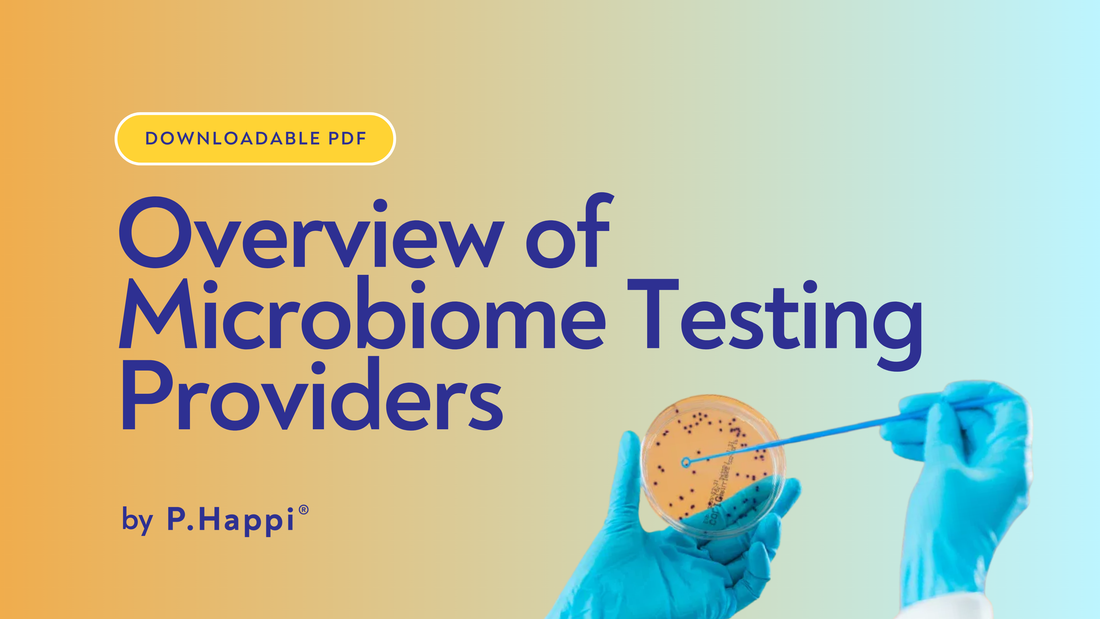
Your Guide to (Microbiome) Testing Providers In The Women's Health Space
Last updated: September 2025 – UK market focus
Important Note: This content is for information purposes only. P.Happi® has no financial affiliation with, and does not receive commission from any of the third-party services mentioned in this educational article. Inclusion of testing providers is not an endorsement, but a way to help you explore available options. Always seek advice from a healthcare professional regarding diagnosis, treatment, or test results and do your own research.
This is a short introduction, download the full guide with the testing providers, their details, pros and cons below.
Understanding The Challenges of Intimate Health Testing
Intimate health issues like UTIs, thrush, and BV can be uncomfortable and urgent. Finding clear answers in those moments can often feel overwhelming. Many women turn to testing because they have been suffering for too long, may have been dismissed, misdiagnosed, or have not received the answers to solve their problem in time, especially when standard tests have come back negative but symptoms persist. At the beginning of this piece, it’s important to note that tests can provide insights but some of them are only for education, hence cannot be used for diagnostic purposes to prescribe medical treatment.
In the UK, and widely also abroad, a dipstick test together with a history of symptoms is often used for first diagnosis. In some cases, normally for more persistent or recurrent cases, the NHS can also culture the urine, look at it under the microscope and test for antibiotic sensitivity. More about the diagnostic UTI pathway for women (under the age of 65) can be found here.
While these pathways have existed for a long time and vary slightly for different patient groups e.g. pregnant women, women over 64 years etc., the tests offered via the NHS can be quite limited. While helpful for some, they do not always provide detailed answers (due to resource limitations), and can sometimes miss infections, especially with more complex cases. As you may have experienced you are pretty sure you had a UTI, but the dipstick test has come back negative. Why? It’s important to note its sensitivity limits. For example, the urine dipstick test checks for nitrites (produced by some bacteria) and leukocyte esterase (white blood cells), but not all bacteria convert nitrates to nitrites, so infections like those caused by e.g. Enterococcus can be missed. If you’ve been drinking more fluids or have already started antibiotics – both common when symptoms begin – your urine may be diluted, reducing white cells, nitrites, or bacteria below the dipstick’s detection threshold.
The aim of this overview is to provide a helpful guide on the different types of tests available in the UK, both direct-to-consumer and clinical.
We know how hard it is when you don’t get clear answers or feel dismissed. We hope this overview helps you take steps towards feeling better and more in control. Test results are only as reliable as the sample you collect and how it is being transported to the lab, so following the instructions of the tests carefully is essential. Most of the more detailed tests are private and not always accepted by every GP, so if you’re considering one, it can be helpful to speak with your GP in advance, or work with a private doctor who is experienced in interpreting these tests and can build a treatment plan around them.
It’s also important to remember that results represent just one moment in time. Your microbiome naturally shifts with factors such as sex, diet, and hygiene, so good to keep in mind when evaluating your results. In some cases, doing both a urine and a vaginal test can provide more clarity, as symptoms in the urovaginal area can often overlap and can be confusing.
Your microbiome plays a big role in your intimate health, and testing is one way to understand what’s going on. If you’d like to dive deeper into how your vaginal and urinary microbiota are tested, we’ve covered it in detail on our blog, read more here.
Types of Testing Methods
There are several ways urinary and vaginal health can be tested, each with its own advantages and limitations. The table below gives a simple overview to help you compare the main options at a glance which tests are available and possibly helpful to get some further answers. We’ve included some guidance below to support your decision-making – for information purposes only.

How to Know if It’s the Right Test for You
If you suffer from recurring discomfort and don’t feel comfortable with the antibiotics that were perhaps being recommended, or doubt they are working, push your GP to check your urine under a microscope, and ask them to culture it for them to check what bacteria are present and against which antibiotics they are sensitive to. If you still don’t get the answers you want, you can research and explore more comprehensive private testing.
Consider the questions below to help decide whether a simple, advanced, or clinician-supported option makes most sense for you:
- Am I generally healthy with uncomplicated symptoms? → Consider a dipstick.
- Do I have repeated, unresolved symptoms? Potentially negative results while still suffering? → Ask your doctor to culture your urine.
- How severe are my symptoms? → Check how quick the turnaround time is.
- Do I have vaginal symptoms too? → Research combined tests that also include analysis for the vaginal microbiome.
- Do you want treatment recommendations afterwards?→ Choose a test that can be used for diagnosis and includes a clinician pathway.
- Do you understand science? → Check for their reporting style (e.g. are the results simple to understand?). You could ask to see an example report in advance to see whether results could be helpful.
- Is accuracy essential? → Go for more sensitive comprehensive tests e.g. sequencing, microbiome tests.
-
Did I review their privacy policy? → Important for molecular/genetic options, look for information regarding where your data is transferred to (the UK, EU, or US?) – if that is important for you. Some of the labs can be abroad, which means your samples leave the country, are subject to transport, and also might take longer to analyse.
Things to Keep in Mind Before Testing
Test results can be influenced by a few factors, so it’s worth checking the details before you get started:
- Medication: Being on prophylactic antibiotics or certain medications can affect your results.
- Instructions: Always read the kit guidance carefully. For example, many microbiome tests advise avoiding sex 48 hrs beforehand. Also check how to best collect the sample. With urine, it is normally a morning mid-stream sample.
- Timing: Most microbiome tests should not be taken during menstruation, as this will contaminate the sample. Ideally you also get the results asap.
- Life stage: Some kits may or may not take menopausal status into account, so check the provider’s notes if this applies to you and could be important.
- Purpose: Check whether the test is for information only or if results can be used for diagnostic purposes. Can a treatment plan be created based on the results
- Standards: Look for ISO or other quality standards for extra reassurance on the quality of the test and test result.
Testing Providers in The UK
There are many different options available in the UK, from at home kits to specialist laboratory services. To help you compare, we’ve highlighted a selection of providers below. This list is not exhaustive and purely for information purposes only. We’ve highlighted a few pros and cons below, but they haven’t been independently verified – please check each provider’s website for accurate, up-to-date information. We do not have any affiliation with the providers listed below.
Note: If you want to read the full overview of positive and negative highlights per test, leave your details below and we will email you the extensive PDF.
Focus Laboratories
- From well-known UTI doctor Catriona Anderson, from Focus Medical Clinic.
- UTI tests, vaginal tests, penile tests available.
- Offers normal microbiology and culture, but also extended culture (recognised to detect more fastidious organisms missed by routine population-based testing).
Digital Microbiology
- UK based company and labs.
- Comprehensive DNA‑based metagenomic tests for UTIs, BV (Bacterial Vaginosis), CV (Cytolytic Vaginosis).
Regenerus Labs
- Regenerus is a testing distributor based in the UK offering a range of MicroGen DX tests (US testing provider) and Salient Bio laboratory tests (UK testing provider) through (affiliated) healthcare professionals.
- MicroGenDx and Salient Bio are widely known in the space for testing and their laboratory standards, and their patient-friendly reporting of results.
Randox Health - Express PCR UTI Test
- Known testing provider in the United Kingdom and Republic of Ireland.
- Offering nationwide locations, with many walk in centres to book local appointments and tests.
- Core philosophy is to shift from reactive treatment of illness to proactive prevention, enabling early detection and management of health issues.
Fresh Urine Microscopy
- An immediate analysis of an unstained, unspun urine sample under a microscope to detect white blood cells (WBCs) and epithelial cells, which are markers for a urinary tract infection (UTI).
- This screening test provides information quickly, with results available before a traditional urine culture (which takes several days).
- Particularly good when symptoms are present but a routine urine dipstick is negative.
- Find provider information in the downloadable guide.
Looking for more support and the full insights on these testing providers? Just leave your details below and we’ll send the complete “Guide to (Microbiome Testing Providers In The Women's Health Space” straight to your inbox.




